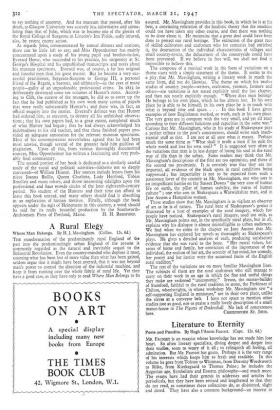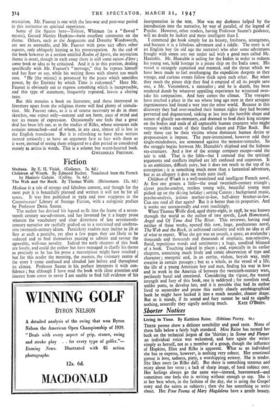Literature to Eternity
Poets and Pundits. By Hugh I'Anson Fausset. (Cape. 12s. 6d.)
MR. FAUSSET is an essayist whose knowledge has not made him lose heart. So often literary specialists, diving deeper and deeper into their studies, seem to weary of it all ; to relinquish all feeling, all admiration. But Mr. Fausset has gusto. Perhaps it is the very range of his interests which keeps him so fresh and readable. In this volume he goes from Tolstoy to Whitman, from Dorothy Wordsworth to Rake, from Kierkegaard to Thomas Paine; he includes the Augustan age, Symbolism and Eastern philosophy—and much more. The essays have ..had their genesis in addresses and articles for periodicals, but they have been revised and lengthened so that they do not read, as sometimes these collections do, as disjointed, slight and dated. They have also a common background—an interest in
mysticism. Mr. Fausset is one with the late-war and post-war period in this insistence on spiritual experience.
Some of the figures here—Tolstoy, Whitman (as a " flawed " mystic), Gerard Manley Hopkins—form excellent comments on the theme. Others, such as the Augustans and Dorothy Wordsworth, are not as amenable, and Mr. Fausset with great tact offers other aspects, only obliquely hinting at his preoccupation. At the end of the book however in a section entitled Realm of Spirit, the mysticism theme is overt, though in each essay there is still some raison d'être ; some book or idea to be criticised. And it is in this portion, dealing specifically with Mr. Fausset's "message," that he repeats himself and has least to say, while his writing flows with almost too much ease. "He (the mystic) is possessed by the peace which sanctifies power, by the Eternity by which Time is redeemed." Here Mr. Fausset is obviously out to express something which is inexpressible, and this type of statement, frequently repeated, leaves a cloying taste.
But this remains a book on literature, and those interested in literature apart from the religious theme will find plenty of stimula- tion. Mr. Fausset takes, as it is of course necessary to do in short sketches, one aspect only—content and not form, state of mind and not its means of expression. Occasionally one feels that a great deal has been left out, as in the studies of Rilke, whose sensuous side remains untouched—and of whom, in any case, almost all is lost in the English translation But it is refreshing to have these writers treated seriously ; to have an argument face to face with them as it were, instead of seeing them relegated to a dim period or considered merely as artists in words. This is a solemn but warm-hearted book.
GWENDOLEN FREEMAN.



































 Previous page
Previous page